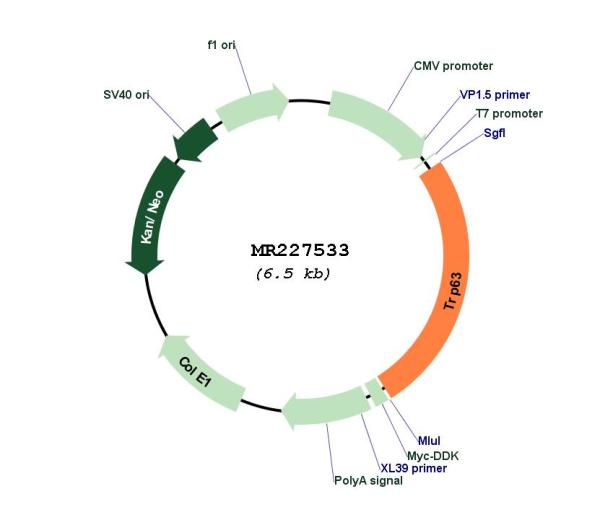Trp63 (NM_001127260) Mouse Tagged ORF Clone
CAT#: MR227533
- TrueORF®
Trp63 (Myc-DDK-tagged) - Mouse transformation related protein 63 (Trp63), transcript variant 2
ORF Plasmid: tGFP
Lentiviral Particles: DDK w/ Puro mGFP w/ Puro
"NM_001127260" in other vectors (4)
Interest in protein/lysate? Submit request here!
USD 198.00
Specifications
| Product Data | |
| Type | Mouse Tagged ORF Clone |
| Tag | Myc-DDK |
| Symbol | Trp63 |
| Synonyms | AI462811; delta; Ket; p6; p7; p51/p; P51/P63; P63; P73l; TAp; Tp63; Trp5; Trp53rp1 |
| Vector | pCMV6-Entry |
| E. coli Selection | Kanamycin (25 ug/mL) |
| Mammalian Cell Selection | Neomycin |
| Sequence Data |
>MR227533 representing NM_001127260
Red=Cloning site Blue=ORF Green=Tags(s) TTTTGTAATACGACTCACTATAGGGCGGCCGGGAATTCGTCGACTGGATCCGGTACCGAGGAGATCTGCC GCCGCGATCGCC ATGAATTTTGAAACTTCACGGTGTGCCACCCTACAGTACTGCCCCGACCCTTACATCCAGCGTTTCATAG AAACCCCAGCTCATTTCTCGTGGAAAGAAAGTTATTACAGATCTGCCATGTCGCAGAGCACCCAGACAAG CGAGTTCCTCAGCCCAGAGGTCTTCCAGCATATCTGGGATTTTCTGGAACAGCCTATATGCTCAGTACAG CCCATCGAGTTGAACTTTGTGGATGAACCTTCCGAAAATGGTGCAACAAACAAGATTGAGATTAGCATGG ATTGTATCCGCATGCAAGACTCAGACCTCAGTGACCCCATGTGGCCACAGTACACGAACCTGGGGCTCCT GAACAGCATGGACCAGCAGATTCAGAACGGCTCCTCGTCCACCAGCCCCTACAACACAGACCACGCACAG AATAGCGTGACGGCGCCCTCGCCCTATGCACAGCCCAGCTCCACCTTTGATGCCCTCTCTCCATCCCCTG CCATTCCCTCCAACACAGATTACCCGGGCCCACACAGCTTCGATGTGTCCTTCCAGCAGTCAAGCACTGC CAAGTCAGCCACCTGGACGTATTCCACCGAACTGAAGAAGCTGTACTGCCAGATTGCGAAGACATGCCCC ATCCAGATCAAGGTGATGACCCCACCCCCACAGGGCGCTGTTATCCGTGCCATGCCTGTCTACAAGAAAG CTGAGCATGTCACCGAGGTTGTGAAACGATGCCCTAACCATGAGCTGAGCCGTGAGTTCAATGAGGGACA GATTGCCCCTCCCAGTCATCTGATTCGAGTAGAAGGGAACAGCCATGCCCAGTATGTAGAAGATCCTATC ACGGGAAGGCAGAGCGTGCTGGTCCCTTATGAGCCACCACAGGTTGGCACTGAATTCACAACAGTCCTGT ACAATTTCATGTGTAACAGCAGCTGCGTCGGAGGAATGAACAGACGTCCAATTTTAATCATCGTTACTCT GGAAACCAGAGATGGGCAAGTCCTGGGCCGACGGTGCTTTGAGGCCCGGATCTGTGCTTGCCCAGGAAGA GACCGGAAGGCAGATGAAGACAGCATCAGAAAGCAGCAAGTATCGGACAGCGCAAAGAACGGCGATGGTA CGAAGCGCCCTTTCCGTCAGAATACACACGGAATCCAGATGACTTCCATCAAGAAACGGAGATCCCCAGA TGATGAGCTGCTGTACCTACCAGTGAGAGGTCGTGAGACGTACGAGATGTTGCTGAAGATCAAAGAGTCA CTGGAGCTCATGCAGTACCTCCCTCAGCACACGATCGAAACGTACAGGCAGCAGCAGCAGCAGCAGCACC AGCACCTACTTCAGAAACAGACCTCGATGCAGTCTCAGTCTTCATATGGCAACAGTTCCCCACCTCTGAA CAAAATGAACAGCATGAACAAGCTGCCTTCCGTGAGCCAGCTTATCAACCCACAGCAGCGCAATGCCCTC ACTCCCACCACCATGCCTGAGGGCATGGGAGCCAACATTCCTATGATGGGCACTCACATGCCAATGGCTG GAGACATGAATGGACTCAGCCCTACCCAAGCTCTCCCTCCTCCACTCTCCATGCCCTCCACCTCCCACTG CACCCCACCACCGCCCTACCCCACAGACTGCAGCATTGTCAGGATTTGGCAAGTC ACGCGTACGCGGCCGCTCGAGCAGAAACTCATCTCAGAAGAGGATCTGGCAGCAAATGATATCCTGGATT ACAAGGATGACGACGATAAGGTTTAA >MR227533 representing NM_001127260
Red=Cloning site Green=Tags(s) MNFETSRCATLQYCPDPYIQRFIETPAHFSWKESYYRSAMSQSTQTSEFLSPEVFQHIWDFLEQPICSVQ PIELNFVDEPSENGATNKIEISMDCIRMQDSDLSDPMWPQYTNLGLLNSMDQQIQNGSSSTSPYNTDHAQ NSVTAPSPYAQPSSTFDALSPSPAIPSNTDYPGPHSFDVSFQQSSTAKSATWTYSTELKKLYCQIAKTCP IQIKVMTPPPQGAVIRAMPVYKKAEHVTEVVKRCPNHELSREFNEGQIAPPSHLIRVEGNSHAQYVEDPI TGRQSVLVPYEPPQVGTEFTTVLYNFMCNSSCVGGMNRRPILIIVTLETRDGQVLGRRCFEARICACPGR DRKADEDSIRKQQVSDSAKNGDGTKRPFRQNTHGIQMTSIKKRRSPDDELLYLPVRGRETYEMLLKIKES LELMQYLPQHTIETYRQQQQQQHQHLLQKQTSMQSQSSYGNSSPPLNKMNSMNKLPSVSQLINPQQRNAL TPTTMPEGMGANIPMMGTHMPMAGDMNGLSPTQALPPPLSMPSTSHCTPPPPYPTDCSIVRIWQV TRTRPLEQKLISEEDLAANDILDYKDDDDKV |
| Chromatograms |
CHROMATOGRAMS
 Sequencher program is needed, download here. |
| Restriction Sites |
SgfI-MluI
Cloning Scheme for this gene
Plasmid Map

|
| ACCN | NM_001127260 |
| ORF Size | 1668 bp |
| OTI Disclaimer | Due to the inherent nature of this plasmid, standard methods to replicate additional amounts of DNA in E. coli are highly likely to result in mutations and/or rearrangements. Therefore, OriGene does not guarantee the capability to replicate this plasmid DNA. Additional amounts of DNA can be purchased from OriGene with batch-specific, full-sequence verification at a reduced cost. Please contact our customer care team at custsupport@origene.com or by calling 301.340.3188 option 3 for pricing and delivery. The molecular sequence of this clone aligns with the gene accession number as a point of reference only. However, individual transcript sequences of the same gene can differ through naturally occurring variations (e.g. polymorphisms), each with its own valid existence. This clone is substantially in agreement with the reference, but a complete review of all prevailing variants is recommended prior to use. More info |
| OTI Annotation | This clone was engineered to express the complete ORF with an expression tag. Expression varies depending on the nature of the gene. |
| Product Components | The ORF clone is ion-exchange column purified and shipped in a 2D barcoded Matrix tube containing 10ug of transfection-ready, dried plasmid DNA (reconstitute with 100 ul of water). |
| Reconstitution | 1. Centrifuge at 5,000xg for 5min. 2. Carefully open the tube and add 100ul of sterile water to dissolve the DNA. 3. Close the tube and incubate for 10 minutes at room temperature. 4. Briefly vortex the tube and then do a quick spin (less than 5000xg) to concentrate the liquid at the bottom. 5. Store the suspended plasmid at -20°C. The DNA is stable for at least one year from date of shipping when stored at -20°C. |
| Reference Data | |
| RefSeq | NM_001127260.1, NP_001120732.1 |
| RefSeq Size | 5288 bp |
| RefSeq ORF | 1668 bp |
| Locus ID | 22061 |
| UniProt ID | O88898 |
| Cytogenetics | 16 17.37 cM |
| MW | 62.5 kDa |
| Gene Summary | This gene encodes tumor protein p63, a member of the p53 family of transcription factors involved in cellular responses to stress and development. The family members include tumor proteins p53, p63, and p73, which have high sequence similarity to one another. This similarity allows p63 and p73 to transactivate p53-responsive genes causing cell cycle arrest and apoptosis. The family members can interact with each other in many ways, including direct and indirect protein interactions. This results in mutual regulation of target gene promoters. Tumor protein p63 -/- mice have several developmental defects which include the lack of limbs and other tissues, such as teeth and mammary glands, which develop as a result of interactions between mesenchyme and epithelium. Both alternative splicing and the use of alternative promoters result in multiple transcript variants encoding different protein isoforms.[provided by RefSeq, Dec 2009] |
Documents
| Product Manuals |
| FAQs |
| SDS |
Resources
Other Versions
| SKU | Description | Size | Price |
|---|---|---|---|
| MC218966 | Trp63 (untagged) - Mouse transformation related protein 63 (Trp63), transcript variant 2, (10ug) |
USD 569.00 |
|
| MG227533 | Trp63 (tGFP-tagged) - Mouse transformation related protein 63 (Trp63) transcript variant 2, (10ug) |
USD 976.00 |
|
| MR227533L3 | Lenti ORF clone of Trp63 (Myc-DDK-tagged) - Mouse transformation related protein 63 (Trp63), transcript variant 2 |
USD 1,076.00 |
|
| MR227533L4 | Lenti ORF clone of Trp63 (mGFP-tagged) - Mouse transformation related protein 63 (Trp63), transcript variant 2 |
USD 1,076.00 |
{0} Product Review(s)
Be the first one to submit a review






























































































































































































































































 Germany
Germany
 Japan
Japan
 United Kingdom
United Kingdom
 China
China


